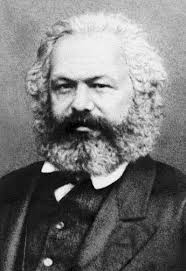I am reblogging this post, from three years ago, in honor of Bi-Centenary Anniversay of Marx. I would like to add that the Marxist analysis of Capitalism is, hands down, far superior to anything currently being taught in conventional economics courses at Universities today. For those who would like to pursue it, David Harvey’s Reading Capital is an excellent series of lectures which goes through and explains the Magnum Opus of Karl Marx. It is a deep Marxist insight that Capitalism works not by force, but by persuading the laborers of the necessity, justice, and fairness of their own exploitation. Modern economic theory is the ideal tool for this purpose. To bring out this essential but ignored aspect of economic theory — that it is nothing more than propaganda for capitalism, it is useful to re-label it as ET1% – The Economic Theory of the top 1%. A more detailed analysis of the deceptive nature of ET1% is provided in my sequence of posts on ET1%: Blindfolds Created by Economic Theory
Published in The Express Tribune, September 7th, 2015.
Ever since its origins in industrialising England, the capitalist economic system has always been subject to crises. There are countless theories as to the causes, consequences, and possible remedies for these. Karl Marx was among the earliest and most famous critics of capitalism. He argued that the source of the wealth produced by capitalism was the labour of the workers. The capitalists use their power to make profits by exploiting workers, depriving them of their due shares of profits. Capitalismrequires growth to prosper, and this could only come by increasing exploitation. Crises would  occur when workers would be oppressed beyond their limits. Eventually, these crises would destroy capitalism as the workers revolted against this unfair system.
occur when workers would be oppressed beyond their limits. Eventually, these crises would destroy capitalism as the workers revolted against this unfair system.
Of course, these ideas are anathema to capitalists. During my own studies of economics in universities, a shallow caricature of Marxist economics…
View original post 580 more words
Like the current fascination with and subjugation to capitalism, once there was the divine right to rule over others. Invented during the medieval period in Europe to provide stability and return prosperity to Europe, the “divine right to rule” did neither. After dozens of bad kings and queens, and a few good ones the willingness of the ordinary person to tolerate this divine right grew short. Even though in the end the monarchy was reestablished the English Civil War attacked this right. Many of Oliver Cromwell’s followers called themselves levelers and after the wars, the phrase “middling sort” was used often to refer to those who exercised government power, particularly military power. Muntzer and his followers in the German Peasant war helped, along with others to establish a rival tradition to class rule. Eventually, even the “smart people” (intelligentsia) got into the act. Marsilius of Padua in “Defensor Pacis” (1324) contended, “The whole body of citizens or its majority alone is the human “legislator”.… The “legislator” alone or the one who rules by its authority has the power to dispense with human laws.…The election of any prince or other official, especially one who has the coercive power is determined solely by the expressed will of the “legislator”…
No prince, still more, no partial council or single person of any position, has full authority and control over other persons, laymen or clergy, without the authorization of the “legislator.” In due course, we come to John Locke, who rejected completely the notion of the divine right of monarchs, countering it with the “natural rights of the people,” from which all governments derive their legitimacy. Much of his justification was still theological, but this was still a turning point. As scientific thinking displaced religion in public life and government, government by democracy and voting became more common, with each citizen having equal access to voting and equality in law. Even still the divine right of monarchs managed to survive into the 20th century. Over 1000 years since its initial creation. While capitalism was never established or justified as completely or powerfully as the divine right of monarchs, its foundations in the 14th century, and particularly it alliances with allies such as Protestant Christianity, the new “middle class,” and the growing banking groups made it difficult to dislodge. Sometimes we just need a larger and harder chisel.